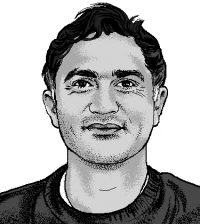The labor that pays my salary
Survival under capitalism makes demands on our flesh—and some of us have to pay more than others.

I met Mel (I’ve changed his name) one summer at a weekly community meal with housed and unhoused people, in a clearing along a highway service road. Our church partnered with others to provide food. Mel had recently relocated to the woods behind a nearby Walmart. “Just passing through,” he told me. “Here until the Spirit calls me elsewhere.”
Later that week, on my commute, I saw him in a yellow vest standing on a median, holding a sign. At the stoplight, as I waited to take a left turn, we chatted and he said he’d like to join my church for worship that Sunday. We quickly worked out the details—before the light turned green—for when and where to pick him up.
Read our latest issue or browse back issues.
That Sunday, at the appointed time, I found the gravel road down from the shopping center—the turnout he had told me about. I spotted him just beyond the tree line. We exchanged a wave as he walked down the hill. He hopped in and swung a gallon-sized Ziploc bag of coins onto his lap. “That’s an impressive haul,” I commented. “All of it from this weekend?”
“Nah, this is my tithe money from the week,” he replied. “At the end of each day I set aside 10 percent of my earnings for the Lord.”
“You’re very generous,” I said. “But our church is alright this month—we’ve got enough for our bills. You should keep that for the stuff you need, like the new tent you were telling me about.”
“Pastor,” he replied firmly, with righteous confidence, “please know I respect you with all that’s due a minister of the gospel, all the honor appropriate for a shepherd of Christ’s flock, but the holy scriptures have counseled all of us to contribute our 10 percent to the Lord’s work, and that’s what I intend to do, whether or not you think your church needs my money.”
“Yes, of course, you’re right.” I tried to walk back what I said. “I was just trying to prioritize your needs. I want to make sure you’re OK out here.”
“Pastor, I appreciate your concern, but I know my life and I know what I need; I know the sacrifices I need to make,” he continued. “Everyone is called to make a decision like that when the offering plate gets passed around.”
“I hear you; everything you’re saying makes a lot of sense to me.” We stopped at a red light, and I turned toward him and nodded in agreement. “I just wish you didn’t have to sacrifice all that for church—and, to be honest, I know a big chunk of our budget goes to my salary, so I’m . . .”
“I think the problem here is that you don’t value your work like you should,” he interrupted, with incisive pastoral care.
“Yeah, good point, Mel, so true, you’ve got me figured out for sure.” I told him about my struggle—the feeling of a guilt I can’t shake—because I grew up watching my parents endure so much pain from work, their backs and feet and hands sore every evening when they got home. And, now, I get paid for writing emails and sermons, for sitting in meetings and talking to people. I’ve escaped the bodily torments my parents have suffered in the course of their work lives.
“And even my parents haven’t worked as hard for a paycheck as you do.” I explained my embarrassment at the mismatch between income and toil, the unfairness of economic life under capitalism’s ledger of valuation. “At the end of the workday you’re sun-scorched and drenched from sweat, while I’m a little stiff from sitting around in air-conditioned rooms.”
“I can’t do nothing about that, Pastor,” he shrugged, and I shook my head slowly in response to our world, to myself. I spent the rest of the drive unsettled, maddened by the fundamental injustices that govern wages and labor, Mel’s work life and mine. Survival under capitalism makes demands on our flesh—and some of us have to pay more with our lives than others, for no good reason.
That Sunday during worship I heard Mel pour his money into the offering plate—the clink and clank of coins crashing into the shallow bowl, 10 percent of his earnings from that week, 10 percent of what he’d endured at that intersection: the thick heat of a southern summer, the choking exhaust from traffic, the contempt of passersby.
My paycheck didn’t mention what Mel went through, nor anyone else who contributed to our budget that month. How would such sacrifices be itemized? The nature of money is to forget through abstraction, to launder all traces of human life from economic transactions. Capitalist exchange converts work into currency. My paycheck offered just a series of numbers, rendering invisible the labor that produced the money.
Mel moved on after that summer. I think about him when I glance online at my monthly direct deposit from church. Our conversations taught me that I’m entangled in the daily grind of the people who contribute to my salary. In the offering plate, my pastoral life connects to their job sites. My work feeds on the generosity of their financial sacrifices.
A theology of work begins here: with acknowledging such dependencies in order to develop a material spirituality of solidarity—to attend to the other’s work life, to cultivate relationships of mutual care, to become each other’s keeper, to accompany one another as we muddle through the demands of our jobs.
Perhaps next summer, if I see Mel again, I’ll ask if he’d let me join him for a shift in the median.
A version of this article appears in the print edition under the title “Paying my check.”







